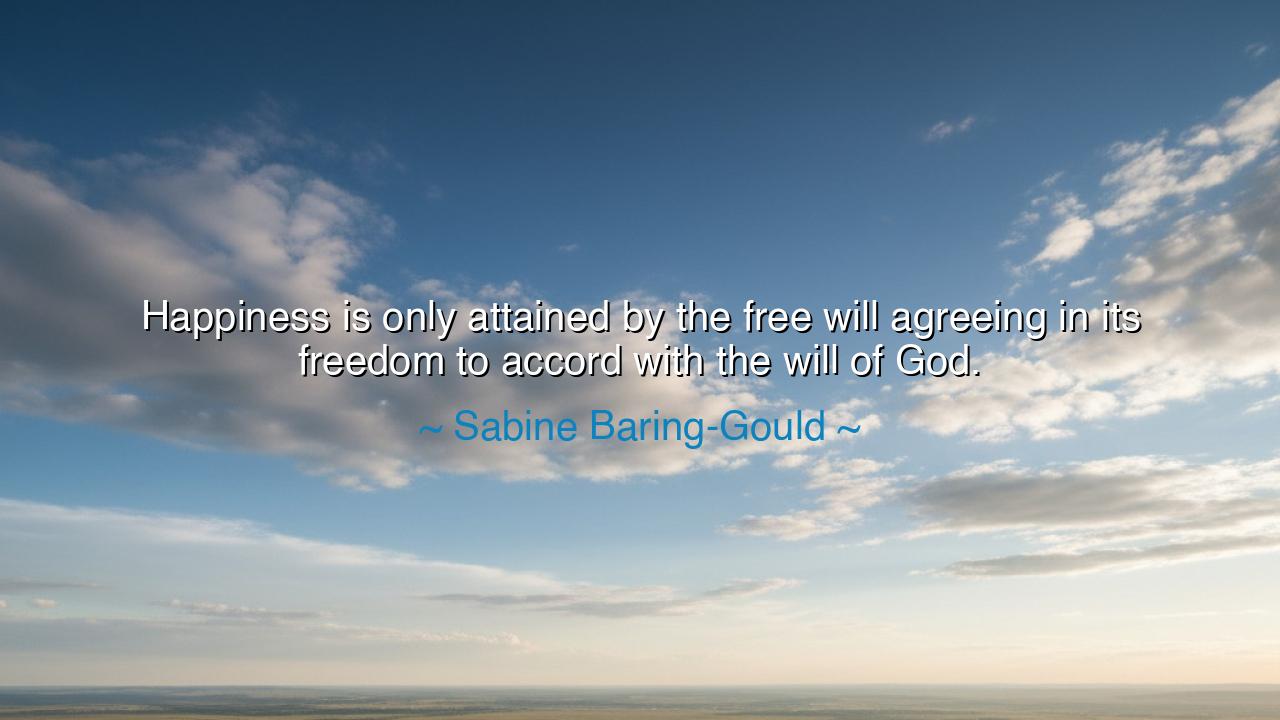
Happiness is only attained by the free will agreeing in its
Happiness is only attained by the free will agreeing in its freedom to accord with the will of God.






“Happiness is only attained by the free will agreeing in its freedom to accord with the will of God.” So wrote Sabine Baring-Gould, the English scholar, clergyman, and hymn writer, whose words rise like a psalm from the heart of both intellect and faith. In this single sentence, he unveils a mystery as old as creation itself—the union between freedom and divine will, between human desire and heavenly order. His insight is not a mere moral maxim, but a revelation: that true happiness is not found in the pursuit of pleasure, nor in the restless chase for power, but in the harmony of a soul freely choosing what is right.
Baring-Gould lived in the nineteenth century, an age of change, when faith wrestled with reason and modern man began to question the old certainties of heaven and earth. Yet in that turmoil, he saw clearly what many had forgotten—that freedom, divorced from virtue, leads not to joy but to emptiness. For man, though free, is not self-created. His will, magnificent as it is, finds peace only when it aligns with the greater will of God, the eternal order that breathes purpose into existence. To act against that order is to rebel against one’s own nature, like a star that tears itself from the heavens and falls into the abyss.
This truth was known even to the ancients. The Greek philosopher Plato spoke of the just soul as one whose parts—reason, spirit, and desire—were in harmony with each other and with the divine ideal of the Good. Baring-Gould, from a Christian soul, said the same in holier tongue: that the will of man must freely choose to accord with the will of God, not by compulsion but by love. For if obedience is forced, it is not virtue, and if freedom is without guidance, it becomes chaos. But when freedom kneels willingly before wisdom, the heart finds peace, and from that peace, happiness is born.
Consider the story of St. Francis of Assisi, who forsook the wealth and privilege of his family to live in perfect harmony with the divine. Many thought him mad to trade gold for rags, luxury for leprosy, comfort for poverty. Yet Francis was the happiest of men, because his free will—uncoerced, unbroken—chose to walk the path of God. He sang with the birds, embraced the outcast, and found joy where others saw suffering. His freedom was not lost; it was perfected. In surrendering to the divine will, he did not diminish himself—he was exalted, as a harp is lifted by the music it was made to play.
So too, Baring-Gould reminds us that to be human is not to be enslaved by fate, but to choose. Yet choice alone is not sacred—it is the direction of choice that gives it power. We may choose the path of the ego, seeking pleasure, dominance, and self-fulfillment, but that road, though glittering, ends in dust. Or we may choose, as he counsels, to align our freedom with God’s purpose—to love, to serve, to create, to forgive. Then the will of man becomes a mirror of the divine, and in that reflection, he finds the only happiness that endures.
The lesson, then, is not one of blind obedience, but of harmonious freedom. God does not demand submission through fear; He invites consent through love. The highest act of freedom is not rebellion but alignment—the soul saying, “Thy will be done,” not as surrender, but as union. For in that moment, the will of man and the will of God are no longer two—they are one. And from that unity flows a joy that the world cannot give and death cannot take away.
To live by this wisdom, each must practice the art of listening to the divine whisper within. When you are torn between ambition and conscience, between pride and compassion, pause and ask: which choice brings peace to the soul, not just pleasure to the body? The answer that calms you is the echo of God’s will, and in following it, you do not lose your freedom—you fulfill it. Align your will not by fear of punishment, but by love of harmony, and you will find what sages and saints have known for ages: that the heart’s truest freedom is to choose the good, and the soul’s deepest happiness is to dwell in the will of God.
Thus, remember the wisdom of Sabine Baring-Gould. Man was made free, not to wander aimlessly, but to seek the divine order in which his spirit was first conceived. Freedom without purpose is chaos; purpose without freedom is tyranny. But freedom in harmony with God’s will—that is peace, that is power, that is everlasting happiness.






AAdministratorAdministrator
Welcome, honored guests. Please leave a comment, we will respond soon